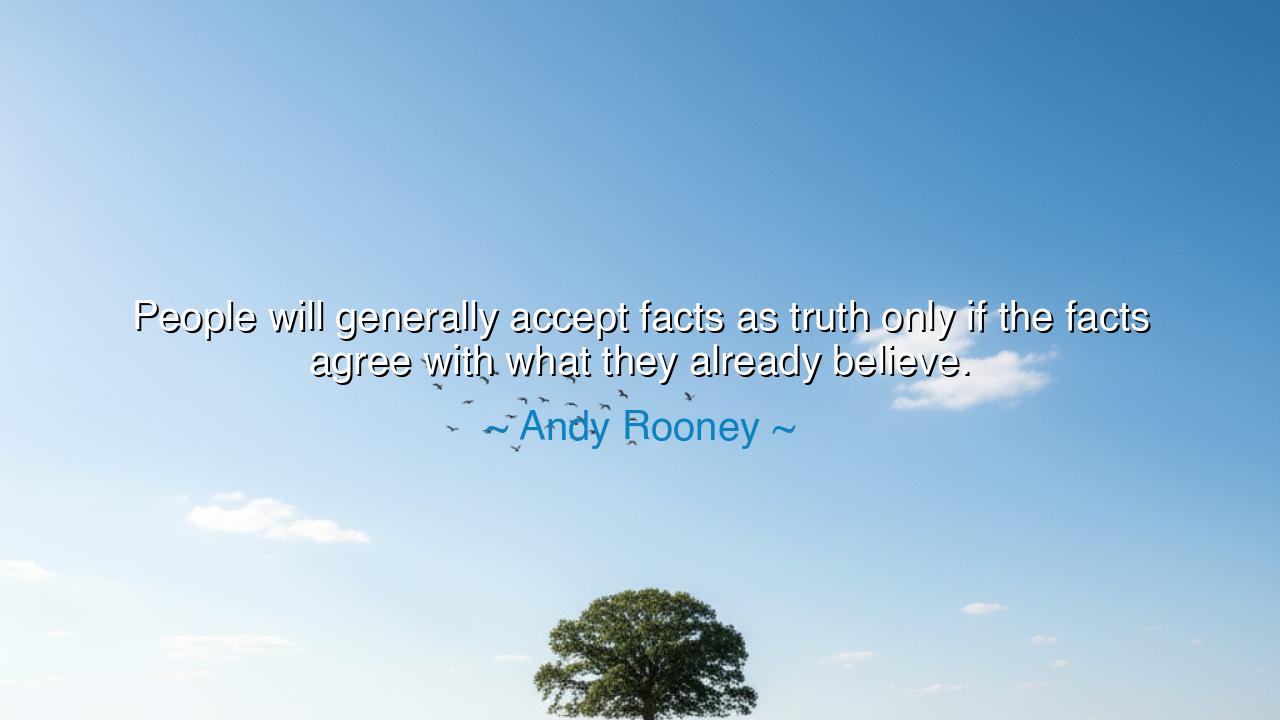
People will generally accept facts as truth only if the facts
People will generally accept facts as truth only if the facts agree with what they already believe.






Hear the sober words of Andy Rooney, observer of human folly, who declared: “People will generally accept facts as truth only if the facts agree with what they already believe.” In this saying lies a mirror held up to the mind of man, revealing the weakness of our nature. For truth is not always loved; rather, we cling to belief, to the comfort of what we have long thought, and we bend facts to fit it. What does not agree with us we dismiss, not because it is false, but because it is unwelcome. Thus Rooney unveils one of the great conflicts of the soul: the difference between truth as it is, and truth as we wish it to be.
The meaning of this quote is clear: men are not always seekers of truth, but defenders of their own convictions. We build fortresses of belief, and within those walls, only the facts that serve us are allowed to enter. Others we cast aside, as if reality itself could be banished by our refusal. It is the great irony of mankind: the very creatures capable of reason are also the masters of self-deception. To embrace a fact that destroys our cherished belief is to wound our pride, to disturb our comfort. Thus, most prefer illusion that flatters over truth that wounds.
The ancients knew this danger well. Recall the fate of Socrates. He spoke facts uncomfortable to the Athenians—that they were ignorant while believing themselves wise. Instead of accepting these truths, they condemned him, choosing the comfort of their false beliefs over the pain of knowledge. His trial stands as eternal witness to Rooney’s teaching: truth is often rejected, not because it lacks proof, but because it does not agree with what men already believe.
History echoes again in the tale of Galileo. With his telescope, he saw moons circling Jupiter and declared that the earth was not the center of all things. The facts were clear to his eyes, yet the rulers of his age clung to their belief that the heavens revolved around man. They silenced him, not because his facts were weak, but because they shattered the belief that gave them power. Only centuries later did men accept as self-evident what once they had violently denied.
This truth is not confined to philosophers and scientists; it lives in every human heart. How often do we reject the criticisms of others, even when just, because they pierce our pride? How often do we twist events to justify our choices, instead of facing the harsh reality of our mistakes? To accept facts against our belief requires humility, courage, and love of truth above self. Few are willing to pay this price.
The lesson, then, is urgent: seek not only facts that agree with you, but facts that challenge you. Welcome the uncomfortable, for it is often the gateway to growth. Question your own convictions, lest you mistake opinion for truth. The man who accepts only what flatters him will remain a child; the one who embraces reality, even when it breaks his heart, becomes wise.
Practical is this path: when faced with new knowledge, pause before rejecting it. Ask yourself—do I deny this because it is false, or because it wounds my belief? Listen to voices unlike your own, for they may carry truths you cannot yet see. In your search for wisdom, do not seek comfort first; seek truth, and let comfort come if it will. For as Rooney reminds us, men are quick to confuse belief with reality, but the true seeker learns to love facts even when they destroy illusions. And in that love of truth lies the beginning of freedom.






TLNguyen Thi Truc Lan
Rooney’s observation resonates with how we selectively accept information to support our views. This raises a question: if we are aware of this bias, can we overcome it? How often do we take in facts objectively, without the filter of our own beliefs? Are we even capable of doing so, or is our acceptance of truth inevitably shaped by our preconceived notions?
TNTho Nguyen
I think Rooney’s quote speaks to a deeper issue about human nature—our need for consistency. When facts don’t align with our beliefs, it feels uncomfortable, so we dismiss them. This makes me wonder, does accepting contradictory facts always lead to growth, or does it sometimes cause confusion and paralysis? Can we ever fully embrace the truth if it challenges the foundation of what we believe in?
4L4B Linh
This quote makes me reflect on how deeply ingrained beliefs can cloud our judgment. I’ve noticed in debates or discussions, people often reject new information that doesn’t align with their existing views, even if the facts are clear. How can we foster more open-mindedness in our society? Is it possible to break down the walls of bias, or do we all need some degree of confirmation bias to feel secure?
QHTran NG Quang Huy
Rooney’s statement raises an important issue about the nature of truth. It’s almost as if we’re more comfortable with truths that fit into our existing worldview, even if they aren't entirely accurate. Why is it so difficult for us to accept facts that challenge us? Can we become more open-minded, or is this a natural defense mechanism against discomfort or confusion?
ATNguyen Tran Anh Thu
This quote reminds me of how people often gravitate toward echo chambers, especially in the age of social media. We surround ourselves with information that confirms what we already think, rejecting anything that challenges our views. How can we break this cycle of selective truth? Is it possible to truly be objective in our acceptance of facts, or are we always influenced by our own biases?